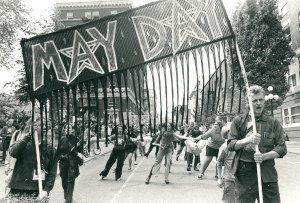
May Day 2000 in Portland (Photo by Bette Lee)
Jon Nelson hosts this episode of the Old Mole, which includes the following segments:
Participatory Budgeting Oregon: U.S. North Americans are mostly withdrawn from politics and seek their economic and social goals – for many just subsistence – through individual striving, like get a credential or suck up to the boss. Unfortunately most of humanity’s economic and social problems are the result of structures that create inequalities and humiliations, and can only be changed by social movements. Bill Resnick talks to Jim Labbe and Tyler Wilkins about “Participatory Budgeting” (PB) that provides appropriations to small towns or city neighborhoods to collectively plan to meet community needs. Participatory budgeting can encourage people formerly withdrawn from politics into thinking about what their community needs, thus facilitates discussion and community organizing around felt common needs. Or PB can be controlled by the city, and operate as a device to coopt grass roots leadership who become dependent on city funds. For more see Participatory Budgeting Oregon.
Very Loud and Very Dumb: Sharon Grant reads excerpts from the article "John Oliver Addresses Debate Over Teaching Critical Race Theory in Schools: 'Very Loud and Very, Very Dumb'", from the Hollywood Reporter of February 20, 2022. "Unfortunately it is important to engage with it because if we don't, the end point that we are heading toward is that honest discussions of race will be shut out of public schools," he said in the ninth-season premiere of 'Last Week Tonight.'
Black Labor in the Making of America: Laurie Mercier talks to Joe Trotter about his important new book, Workers on Arrival: Black Labor in the Making of America. Joe William Trotter, Jr., is Professor of History and Social Justice and Founder and Director of the Center for Africanamerican Urban Studies and the Economy at Carnegie Mellon University. He is the author of Black Milwaukee and Coal, Class, and Color and past President of the Labor and Working Class History Association. This interview originally aired on February 3, 2020.
- KBOO

